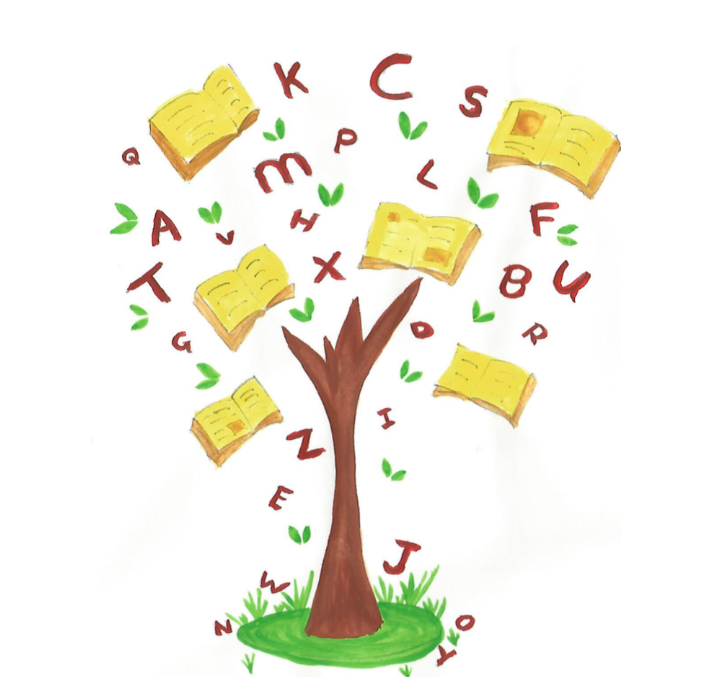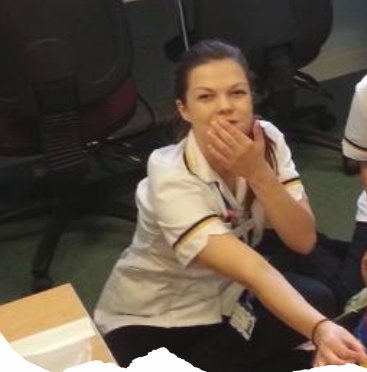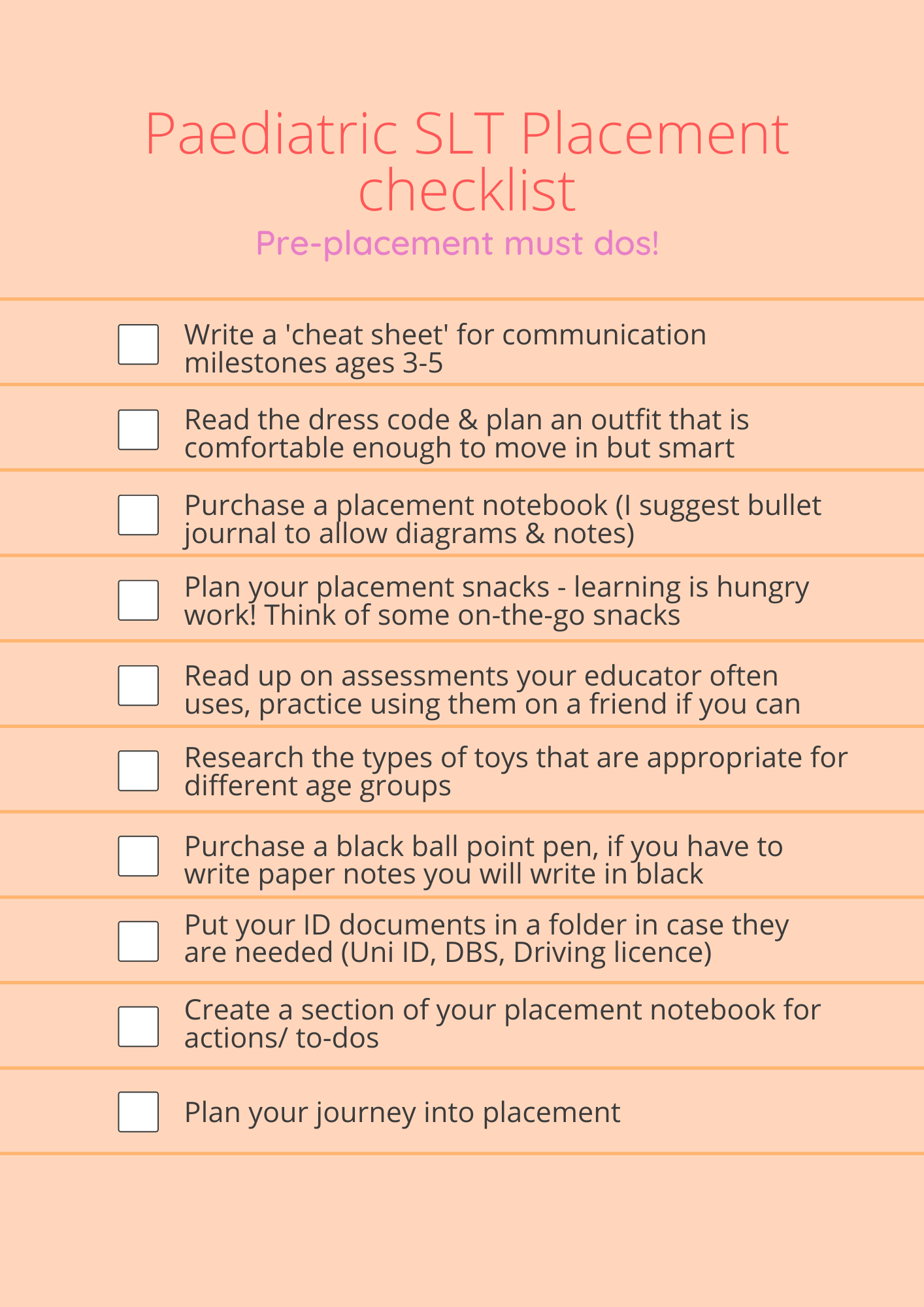10 things you should do before your paediatric speech therapy placement
Going on your first SLT placement - you will want to do these things to get prepared!
“Failing to plan is planning to fail” - Benjamin Franklin
Now if you are anything like me you will be feeling ALL the feelings about your first paediatric speech and language therapy placement! Excited to finally do the job, nervous that you don’t really know what you’re doing and apprehensive about what it will be like (will you even like being a therapist?).
First off I want to reassure you that in this situation Benjamin Franklin isn’t totally right about placement! You have been prepping and planning throughout your degree by learning about communication, speech sounds, linguistics, neurology, anatomy, child development…you have been planning. So don’t feel like you need to go into overdrive preparing for your placement. The point of placement is to learn. You will feel out of your depth, you’re supposed to! Try to embrace the feeling and just go with it, remember, your educator was you once.
If you do want to feel a little more prepped I’ve got you! Below is my 10 pre-placement actions that you should take if you want to feel that little more prepared. From things to buy, to things to read, this list has my top tips.
Save/ download the checklist to refer to later, and check out the links below for my placement prep must-haves!
P.S. did you know I now have an Etsy shop with resources for SLTs to be just like you? Want to check it out? Click here!
Top 10 questions I get asked as a Speech and Language Therapist. From SLTs-to-be!
Speech and language therapy student questions!
Each month over on the sw_speechtherapy instagram page I go live and answer questions from speech and language therapy students, and prospective SLTs.
We cover a lot of different topics, so I thought I would give you the run down of the top 10 questions I get asked as a paediatric speech and language therapist!
Where do Speech and Language Therapists work?
Essentially anywhere communication (or eating and drinking) happens we could work! That being said the vast majority of therapists work in hospitals, clinics, schools or clients homes.
How can you become a Speech and Language Therapist?
Speech and Language Therapist (SLT)/ Speech Therapist is a protected title. This means that you can only call yourself this if you have the appropriate level of training and ongoing supervision to do so. Currently the only way to become a SLT is through undertaking an undergraduate or masters degree program. From Autumn 2022 Essex University will also be offering a degree-level apprenticeship. For full details of how to become a SLT have a look at the RCSLT Website.
What do you love the most being a Speech Therapist?
Being a part of a families journey, and supporting their little one to become a confident and competent communicator. I also love that playing hide and seek is legitimately a part of my job!
What you find the hardest as a Speech and Language Therapist?
Meeting little ones and their family who are really struggling, for whatever reason, and wishing I could make it all go away in the wave of a magic wand.
How did you choose your specialism?
I chose to work in early years as this is where I felt I could make the most impact. It also allows me to work on lots of skills in a play-based way, as opposed to “traditional” sit-down-at-the-table speech therapy.
Who is involved in the Multi Disciplinary Team?
I am answering this from a paediatric perspective but please know this will differ depending on what is going on with the child. I also want to add here that although family are not professionals they are one of the most important parts of a little one’s team, so I am putting them at the top of this list. In terms of other professionals involved, their team may consist of; teachers, special educational needs co-ordinator (SENCo), Occupational Therapists (OT), Physiotherapists (PT), Play therapists, dieticians, audiology, GP, paediatrician, behaviour analysts, other/ specialist speech therapists.
How do you get children to engage with you in therapy sessions?
Building a connection with little ones is one of the most important things you can do as a therapist. This enables children to feel safe with us and allows them to attempt things that are tricky for them (like talking, following instructions, playing in new ways). I always spend a good chunk of time building rapport with children before I ask anything of them. This may mean following their lead, it may mean offering toys ‘for free’, it may mean modelling play with zero expectation placed on them.
Top tips for learning the IPA?
In case you don’t know the IPA or International Phonetic Alphabet is a collection of symbols SLTs use to transcribe speech. We use this because the English alphabet is not fit for this purpose! How would we know which sound another therapist meant when each letter is produced so differently depending on the other letters around it?! If they wrote “e” did they mean the “e” in ‘bed’ or the “e” in ‘equal’ or the “e” in ‘cafe’! (Ok that last one is an anomaly but you get the point!)
If you are a SLT-to-be learning the IPA my top tip is to practice. A Lot. Download the IPA app so you can hear the sounds and set up a little group with a few others on your course where you transcribe sentences and compare notes.
What books do you recommend?
Children’s Speech Sound Disorders - Caroline Bowen
From Birth to 5 Years - Mary Sheridan
English Phonetics and Phonology - Peter Roach
Grammar, A Student’s Guide - James Hurford
What should you pack in your bag for your first clinical speech therapy placement?
Water bottle (& snacks!)
Notepad & black pen
Ipad/ Laptop
Stickers
Small bag of fun toys (windup, sensory toys, bubbles balloons)
Tools to make data collection easier: stop watch, clicker
For more Q&As follow me on instagram @sw_speechtherapy where I answer SLT-to-be questions each month live!





